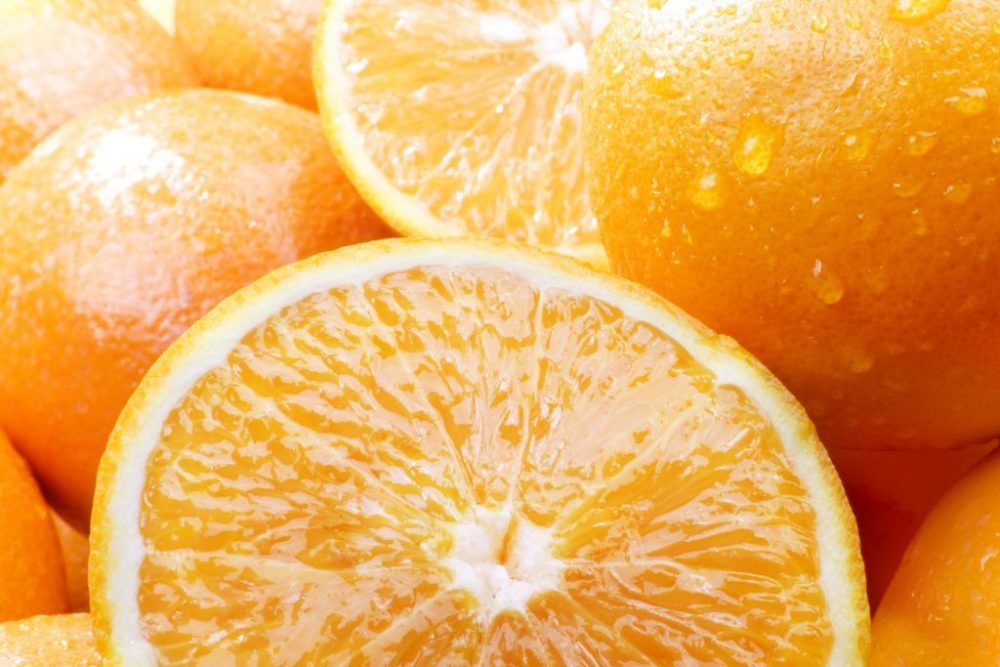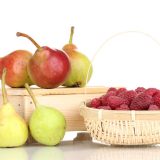

Consuming foods that resemble the colors of the rainbow is a practice advocated in all sorts of media outlets and nutritional awareness campaigns. Eating brightly colored fruit and vegetables provides the body with phytochemicals, naturally occurring substances that are loaded with health benefits. Because they contain valuable types of phytochemicals, orange-colored foods are among the most important for living a healthy, long life.
According to Susan Bowerman, MS, RD, CSSD, a lecturer in the department of food science and nutrition at Cal Poly San Luis Obispo and co-author of “What Color Is Your Diet?”, a purely beige diet may fill Americans up now, but it could cost them later. Bowerman describes food manufacturers as creating foods that are quick, inexpensive and beige by relying on starches, fats and sweets. Unfortunately, the packaged convenience foods that make up a majority of the typical American diet are high in refined carbohydrates and extremely low in vitamins, minerals, fiber and phytochemicals.
Phytochemicals refer to a wide variety of plant compounds and include antioxidants, flavonoids, polyphenols, carotenoids, anthocyanins and many other substances that have a positive effect on human health. Scientists have identified thousands of phytochemicals, although only a small fraction have been studied closely. Some of the most studied and important phytochemicals (like beta-carotene and Vitamin C) are concentrated in orange foods.
In addition to orange-colored food’s phytochemical content, this color may exert a benefit on mood. According to chromotherapy, the use of color as a vibrational healing tool, the orange color can imbue energy, enthusiasm, joy, happiness, sensuality, sexuality, generosity, sociability, pleasure, independence, a sense of freedom, creativity, inventiveness and constructiveness.
In general, orange foods are nutritional powerhouses – high in phytochemicals such as Vitamin C, carotenoids and bioflavonoids. Eating orange foods has been associated with:
- Skin health
- Eye health
- Increased immunity
- Reduced cancer risk
- A healthy heart
Six of the most healthful orange foods include:
- Orange Citrus Fruit – Oranges, tangerines and other citrus fruits contain herperidin and naringenin, powerful phytochemicals that reduce inflammation and blood vessel damage caused by poor diets. Oranges contain high levels of magnesium and fiber, which help strengthen bones and improve digestion. In addition, citrus is loaded with the immune boosting Vitamin C.
- Carrots – Carrots are a great source of beta-carotene, a precursor to Vitamin A. Beta-carotene improves eyesight, delays the onset of aging and protects the skin from the sun’s damaging rays.
- Sweet Potatoes – Possibly one of the healthiest veggies we can eat, sweet potatoes are high in fiber, Vitamins A and C, iron and antioxidants. Another great source of beta-carotene, sweet potatoes promote healthy skin, increased immunity and a decreased risk of cancer. Besides being a pre-cursor to Vitamin A, research shows that sweet potatoes have anti-inflammatory properties.
- Turmeric – This orange-colored spice that gives curry its vibrant hue is a powerful disease-fighting tuber from the ginger family. Turmeric is a potent anti-inflammatory, a natural blood thinner and even has antifungal and antibacterial properties. Some healthcare providers suggest turmeric for protecting against Alzheimer’s, arthritis, atherosclerosis and cancer.
- Butternut Squash – A member of the gourd family, butternut squash contains a great deal of fiber and carotenoids – both of which protect against heart disease. With high levels of beta-carotene, Vitamin C, potassium and Vitamin B6, this squash supports cardiovascular, bone, immune and nervous system health.
- Peaches – High in Vitamins A, C, E, K, and fiber, peaches have been shown to help prevent cellular damage, promote healthier digestion, reduce inflammation and help reduce cancer risk.
Although there is no equitable substitute for consuming a whole foods diet heavy on bright orange produce, a highly absorbable form of turmeric, Turmeric 95, provides 20x the absorption of other turmeric supplements and contains 750 mg of turmeric standardized to contain 95% curcuminoids for high potency.
Americans’ fondness for foods lacking color seems to parallel the myriad of health problems we experience. By purposefully incorporating orange foods into your diet (especially oranges, sweet potatoes, butternut squash, turmeric, carrots and peaches), you will be giving your health a major boost. Besides potentially lifting your spirits, the phytochemicals in orange foods aids the immune system, the skin, the heart and the eyes via their potent anti-oxidant and anti-inflammatory activity.




